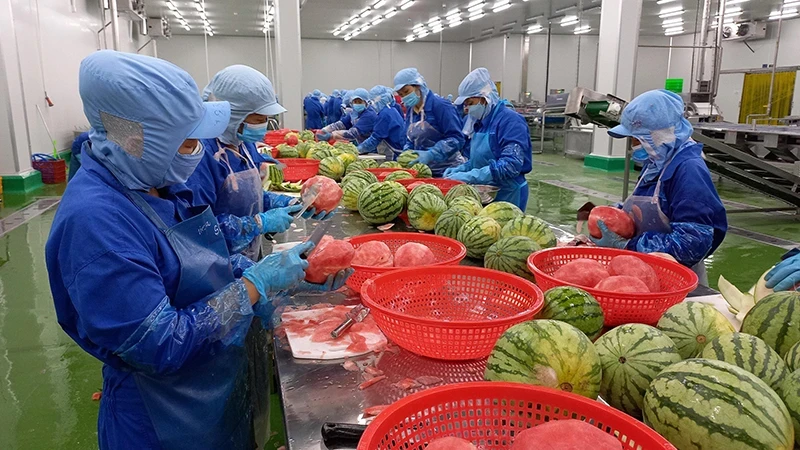At the end of October, the Vietnam-UAE Comprehensive Economic Partnership Agreement (CEPA) was signed, becoming the first free trade agreement Vietnam signed with an Arab country, an important premise for Vietnam to promote the export of key products to the United Arab Emirates (UAE); including key agricultural products such as seafood, rice, vegetables, coffee and pepper…

Fruit and vegetable exports have great growth opportunities in the UAE.
According to the Multilateral Trade Policy Department (Ministry of Industry and Trade), the UAE is currently one of Vietnam’s leading important trade and investment partners in the Middle East, and is a gateway for Vietnam to access the Middle East as well as West Asia and Africa markets.
Potential market
Statistics from the General Department of Customs show that in the period 2018-2023, the total trade exchange between the two countries reached an average of about 5 billion USD/year. In terms of trade balance, Vietnam always has a large trade surplus with the UAE market, from 3-4 billion USD/year. This result is contributed by many agricultural sectors, as Vietnam’s agricultural exports to the UAE have recorded growth in recent years.
According to the Vietnam Association of Seafood Exporters and Producers (VASEP), from 2018 to 2022, the UAE ranked 16th in shrimp imports from Vietnam, accounting for about 0.5% of the total value of Vietnam’s shrimp exports to markets. Each year, Vietnam’s shrimp export turnover to the UAE reaches about 20 million USD.
Although small, this is a potential market because the demand for seafood, including shrimp, is increasing day by day. Ms. Phung Thi Kim Thu – Shrimp market expert (VASEP) said: The signing of CEPA will open up more opportunities for shrimp exports to the UAE. In the first 9 months of 2024, shrimp export turnover to this market reached 7.4 million USD, accounting for 0.3% and growing by 34% over the same period in 2023.
Vietnam is also the largest supplier of pangasius in the UAE, accounting for 40-50% of the market share. The UAE has many suitable factors to become an important seafood trading partner of Vietnam as the per capita seafood consumption in this country is higher than the world average.
Because the UAE’s agricultural economic structure accounts for only about 1%, up to 90% of seafood consumption must be imported. On the other hand, the growing population, high income, and the increasing interest of young people in seafood protein with online searches for seafood products skyrocketing in recent years are the premise for the ability to consume seafood here.
In addition, data from the Import-Export Department (Ministry of Industry and Trade) shows that in the first 8 months of 2024, the UAE has become the third largest pepper export market of Vietnam, after the US and Germany, with a volume of 11,779 tons, worth nearly 61 million USD, an increase of 30.5% in volume and up to 100.2% in value compared to the same period in 2023. Therefore, CEPA is expected to be a great opportunity for the Vietnamese pepper industry to increase turnover in this market.
Increasing competitiveness for agricultural products
It can be seen that the CEPA Agreement is a great opportunity for Vietnamese agricultural products to penetrate deeply into the UAE market when this country commits to eliminating tariffs according to the roadmap for 99% of Vietnam’s export turnover to the UAE; at the same time, Vietnam also commits to eliminating tariffs according to the roadmap for 98.5% of UAE’s export turnover to Vietnam. The Agreement also includes many provisions to facilitate trade and investment, in line with current trends of digital transformation and green development.
However, to effectively utilize the CEPA Agreement and increase agricultural, forestry and fishery exports to the UAE, Vietnamese agricultural sectors also need to promote existing advantages and further improve product quality to increase competitiveness; focus on developing agricultural products and Halal food for Muslims.
According to VASEP, in the UAE, Vietnamese enterprises must compete directly with enterprises from a number of countries that have signed FTAs with the UAE such as: India, Indonesia, Israel, Turkey… Specifically, with shrimp products, Vietnam must compete with shrimp from India, China, Ecuador.
While Indian shrimp accounts for nearly 60-70% of the market share, Vietnam’s shrimp market share only accounts for about 5-7%. Therefore, in the coming time, along with taking advantage of tariff advantages, enterprises need to change production and management methods, reduce intermediate costs to increase product competitiveness; promote the development of a Halal certification system for shrimp products when exporting to this market.
According to First Secretary, Head of the Vietnam Trade Office in the UAE Truong Xuan Trung, the UAE is becoming an attractive market for agricultural and food exporters. Although it is an open market with almost no trade barriers, the UAE is a fiercely competitive market. Exported products must ensure food hygiene and safety, the ratio of chemicals and pesticides must not exceed the permitted level, not to mention a series of Halal regulations for imported food and beverages.
To support Vietnamese enterprises exporting to the UAE, since the beginning of the year, the Vietnam Trade Office in the UAE has also taken many trade promotion measures, such as: Coordinating with the Dubai Chamber of Commerce to organize the sending of Dubai business delegations from different fields to Vietnam to attend business forums; working with UAE supermarket chains such as West Zone, Choithrams and UAE distribution corporations to prepare for Vietnamese trade promotion delegations to meet and work; supporting a number of corporations and enterprises to connect with partners and verify information about import partners in the UAE, etc.
Source: https://baolangson.vn/tan-dung-co-hoi-xuat-khau-nong-san-sang-uae-5027609.html
